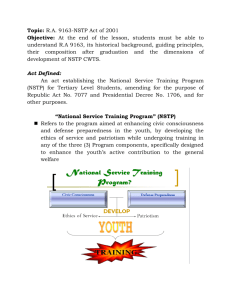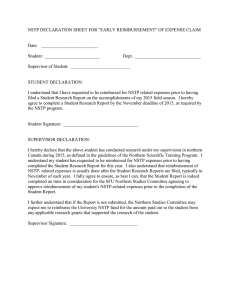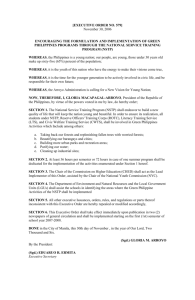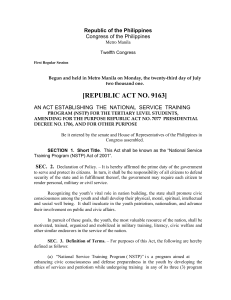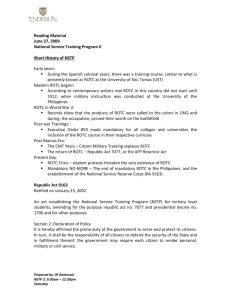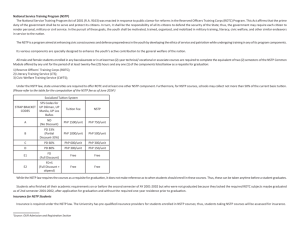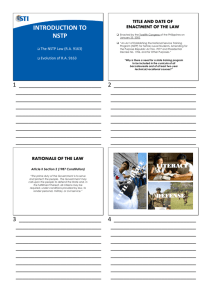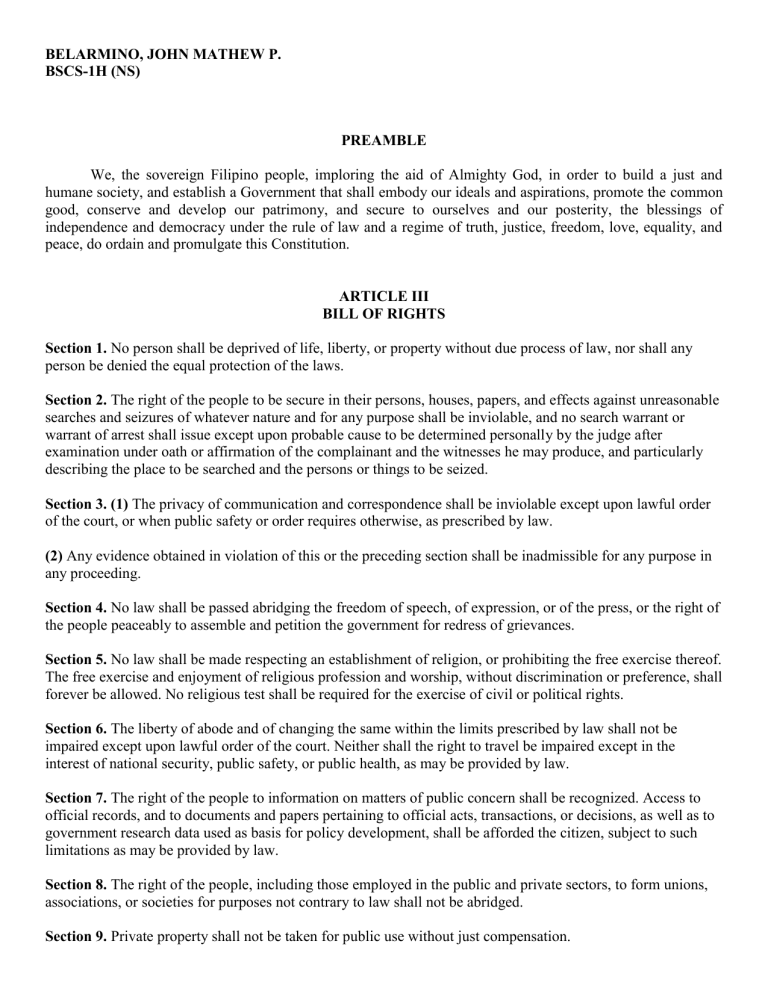
BELARMINO, JOHN MATHEW P. BSCS-1H (NS) PREAMBLE We, the sovereign Filipino people, imploring the aid of Almighty God, in order to build a just and humane society, and establish a Government that shall embody our ideals and aspirations, promote the common good, conserve and develop our patrimony, and secure to ourselves and our posterity, the blessings of independence and democracy under the rule of law and a regime of truth, justice, freedom, love, equality, and peace, do ordain and promulgate this Constitution. ARTICLE III BILL OF RIGHTS Section 1. No person shall be deprived of life, liberty, or property without due process of law, nor shall any person be denied the equal protection of the laws. Section 2. The right of the people to be secure in their persons, houses, papers, and effects against unreasonable searches and seizures of whatever nature and for any purpose shall be inviolable, and no search warrant or warrant of arrest shall issue except upon probable cause to be determined personally by the judge after examination under oath or affirmation of the complainant and the witnesses he may produce, and particularly describing the place to be searched and the persons or things to be seized. Section 3. (1) The privacy of communication and correspondence shall be inviolable except upon lawful order of the court, or when public safety or order requires otherwise, as prescribed by law. (2) Any evidence obtained in violation of this or the preceding section shall be inadmissible for any purpose in any proceeding. Section 4. No law shall be passed abridging the freedom of speech, of expression, or of the press, or the right of the people peaceably to assemble and petition the government for redress of grievances. Section 5. No law shall be made respecting an establishment of religion, or prohibiting the free exercise thereof. The free exercise and enjoyment of religious profession and worship, without discrimination or preference, shall forever be allowed. No religious test shall be required for the exercise of civil or political rights. Section 6. The liberty of abode and of changing the same within the limits prescribed by law shall not be impaired except upon lawful order of the court. Neither shall the right to travel be impaired except in the interest of national security, public safety, or public health, as may be provided by law. Section 7. The right of the people to information on matters of public concern shall be recognized. Access to official records, and to documents and papers pertaining to official acts, transactions, or decisions, as well as to government research data used as basis for policy development, shall be afforded the citizen, subject to such limitations as may be provided by law. Section 8. The right of the people, including those employed in the public and private sectors, to form unions, associations, or societies for purposes not contrary to law shall not be abridged. Section 9. Private property shall not be taken for public use without just compensation. Section 10. No law impairing the obligation of contracts shall be passed. Section 11. Free access to the courts and quasi-judicial bodies and adequate legal assistance shall not be denied to any person by reason of poverty. Section 12. (1) Any person under investigation for the commission of an offense shall have the right to be informed of his right to remain silent and to have competent and independent counsel preferably of his own choice. If the person cannot afford the services of counsel, he must be provided with one. These rights cannot be waived except in writing and in the presence of counsel. (2) No torture, force, violence, threat, intimidation, or any other means which vitiate the free will shall be used against him. Secret detention places, solitary, incommunicado, or other similar forms of detention are prohibited. (3) Any confession or admission obtained in violation of this or Section 17 hereof shall be inadmissible in evidence against him. (4) The law shall provide for penal and civil sanctions for violations of this section as well as compensation to and rehabilitation of victims of torture or similar practices, and their families. Section 13. All persons, except those charged with offenses punishable by reclusion perpetua when evidence of guilt is strong, shall, before conviction, be bailable by sufficient sureties, or be released on recognizance as may be provided by law. The right to bail shall not be impaired even when the privilege of the writ of habeas corpus is suspended. Excessive bail shall not be required. Section 14. (1) No person shall be held to answer for a criminal offense without due process of law. (2) In all criminal prosecutions, the accused shall be presumed innocent until the contrary is proved, and shall enjoy the right to be heard by himself and counsel, to be informed of the nature and cause of the accusation against him, to have a speedy, impartial, and public trial, to meet the witnesses face to face, and to have compulsory process to secure the attendance of witnesses and the production of evidence in his behalf. However, after arraignment, trial may proceed notwithstanding the absence of the accused provided that he has been duly notified and his failure to appear is unjustifiable. Section 15. The privilege of the writ of habeas corpus shall not be suspended except in cases of invasion or rebellion when the public safety requires it. Section 16. All persons shall have the right to a speedy disposition of their cases before all judicial, quasijudicial, or administrative bodies. Section 17. No person shall be compelled to be a witness against himself. Section 18. (1) No person shall be detained solely by reason of his political beliefs and aspirations. (2) No involuntary servitude in any form shall exist except as a punishment for a crime whereof the party shall have been duly convicted. Section 19. (1) Excessive fines shall not be imposed, nor cruel, degrading or inhuman punishment inflicted. Neither shall the death penalty be imposed, unless, for compelling reasons involving heinous crimes, the Congress hereafter provides for it. Any death penalty already imposed shall be reduced to reclusion perpetua. (2) The employment of physical, psychological, or degrading punishment against any prisoner or detainee or the use of substandard or inadequate penal facilities under subhuman conditions shall be dealt with by law. Section 20. No person shall be imprisoned for debt or non-payment of a poll tax. Section 21. No person shall be twice put in jeopardy of punishment for the same offense. If an act is punished by a law and an ordinance, conviction or acquittal under either shall constitute a bar to another prosecution for the same act. Section 22. No ex post facto law or bill of attainder shall be enacted. REPUBLIC ACT NO. 9163 AN ACT ESTABLISHING THE NATIONAL SERVICE TRAINING PROGRAM (NSTP) FOR TERTIARY LEVEL STUDENTS, AMENDING FOR THE PURPOSE REPUBLIC ACT NO. 7077 AND PRESIDENTIAL DECREE NO. 1706, AND FOR OTHER PURPOSES Be it enacted by the Senate and House of Representatives of the Philippines in Congress assembled: Section 1. Short Title - This Act shall be known as the "National Service Training Program (NSTP) Act of 2001". Section 2. Declaration of Policy - It is hereby affirmed the prime duty of the government to serve and protect its citizens. In turn, it shall be the responsibility of all citizens to defend the security of the State and in fulfilment thereof, the government may require each citizen to render personal, military or civil service. Recognizing the youth's vital role in nation-building, the State shall promote civic consciousness among the youth and shall develop their physical, moral, spiritual, intellectual and social well-being. It shall inculcate in the youth patriotism, nationalism, and advance their involvement in public and civic affairs. In pursuit of these goals, the youth, the most valuable resource of the nation, shall be motivated, trained, organized and mobilized in military training, literacy, civic welfare and other similar endeavours in the service of the nation. Section 3. Definition of Terms - For purposes of this Act, the following are hereby defined as follows: (a) "National Service Training Program (NSTP)" is a program aimed at enhancing civic consciousness and defense preparedness in the youth by developing the ethics of service and patriotism while undergoing training in any of its three (3) program components. Its various components are specially designed to enhance the youth's active contribution to the general welfare. (b) "Reserve Officers' Training Corps (ROTC)" is a program institutionalized under Sections 38 and 39 of Republic Act No. 7077 designed to provide military training to tertiary level students in order to motivate, train, organize and mobilize them for national defense preparedness. (c) "Literacy Training Service" is a program designed to train students to become teachers of literacy and numeracy skills to school children, out of school youth, and other segments of society in need of their service. (d) "Civic Welfare Training Service" refers to programs or activities contributory to the general welfare and the betterment of life for the members of the community or the enhancement of its facilities, especially those devoted to improving health, education, environment, entrepreneurship, safety, recreation and morals of the citizenry. (e) "Program component" shall refer to the service components of the NSTP as enumerated in Section 4 of this Act. Section 4. Establishment of the National Service Training Program. - There is hereby established a National Service Training Program, which shall form part of the curricula of all baccalaureate degree courses and of at least two (2)-year technical vocational courses and is a requisite for graduation, consisting of the following service components: (1) The Reserve Officers' Training Corps (ROTC), which is hereby made option and voluntary upon the effectivity of this Act; (2) The Literacy Training Service; and (3) The Civic Welfare Training Service The ROTC under the NSTP shall instill patriotism, moral virtues, respect for rights of civilians, and adherence to the Constitution, among others. Citizenship training shall be given emphasis in all three (3) program components. The Commission on Higher Education (CHED) and Technical Education and Skills Development Authority (TESDA), in consultation with the Department of National Defense (DND), Philippine Association of State Universities and Colleges (PASUC), Coordinating Council of Private Educational Associations of the Philippines (COCOPEA) and other concerned government agencies, may design and implement such other program components as may be necessary in consonance with the provisions of this Act. Section 5. Coverage - Students, male and female, of any baccalaureate degree course or at least two (2)-year technical vocational courses in public and private educational institutions shall be required to complete one (1) of the NSTP components as requisite for graduation. Section 6. Duration and Equivalent Course Unit - Each of the aforementioned NSTP program components shall be undertaken for an academic period of two (2) semesters. In lieu of the two (2) semester program for any of the components of the NSTP, a one (1)-summer program may be designed, formulated and adopted by the DND, CHED, and TESDA. Section 7. NSTP Offering in Higher and Technical-Vocational Educational Institutions - All higher and technical-vocational institutions, public and private, must offer at least one of the program components; Provided, that State universities and colleges shall offer the ROTC component and at least one other component as provided herein; Provided, further, that private higher and technical-vocational education institutions may also offer the ROTC if they have at least three hundred and fifty (350) cadet students. In offering the NSTP whether during the semestral or summer periods, clustering of affected students from different educational institutions may be done, taking into account logistics, branch of service and geographical considerations. Schools that do not meet the required number of students to maintain the optional ROTC and any of the NSTP components shall allow their students to cross-enroll to other schools irrespective of whether or not the NSTP components in said schools are being administered by the same or another branch of service in the Armed Forces of the Philippines (AFP), CHED and TESDA to which schools are identified. Section 8. Fees and Incentives - Higher and technical vocational institutions shall not collect any fee for any of the NSTP components except basic tuition fees, which shall not be more than fifty percent (50%) of what is currently charged by schools per unit. In the case of ROTC, the DND shall formulate and adopt a program of assistance and/or incentive to those students who will take the said component. The school authorities concerned, CHED and TESDA shall ensure that group insurance for health and accident shall be provided for students enrolled in any of the NSTP components. Section 9. Scholarships - There is hereby created a Special Scholarship Program for qualified students taking the NSTP which shall be administered by the CHED and TESDA. Funds for this purpose shall be included in the annual regular appropriations of the CHED and TESDA. Section 10. Management of the NSTP Components - The school authorities shall exercise academic and administrative supervision over the design, formulation, adoption and implementation of the different NSTP components in their respective schools; Provided, That in case a CHED- or TESDA-accredited non-government organization (NGO) has been contracted to formulate and administer a training module for any of the NSTP components, such academic and administrative supervision shall be exercised jointly with that accredited NGO; Provided, further, That such training module shall be accredited by the CHED and TESDA. The CHED and TESDA regional offices shall oversee and monitor the implementation of the NSTP under their jurisdiction to determine if the trainings are being conducted in consonance with the objectives of this Act. Periodic reports shall be submitted to the CHED, TESDA and DND in this regard. Section 11. Creation of the National Service Reserve Corps - There is hereby created a National Service Reserve Corps, to be composed of the graduates of the non-ROTC components. Members of this Corps may be tapped by the State for literacy and civic welfare activities through the joint effort of the DND, CHED and TESDA. Graduates of the ROTC shall form part of the Citizens' Armed Force, pursuant to Republic Act No. 7077. Section 12. Implementing Rules. - The DND, CHED and TESDA shall have the joint responsibility for the adoption of the implementing rules of this Act within sixty (60) days from the approval of this Act. These three (3) agencies shall consult with other concerned government agencies, the PASUC and COCOPEA, NGOs and recognized student organizations in drafting the implementing rules. The implementing rules shall include the guideline for the adoption of the appropriate curriculum for each of the NSTP components as well as for the accreditation of the same. Section 13. Transitory Provisions - Students who have yet to complete the Basic ROTC, except those falling under Section 14 of this Act, may either continue in the program component they are currently enrolled or shift to any of the other program components of their choice; Provided, That in case he shifts to another program component, the Basic ROTC course he has completed shall be counted for the purpose of completing the NSTP requirement; Provided, further, That once he has shifted to another program component, he shall complete the NSTP in component. Section 14. Suspension of ROTC Requirement - The completion of ROTC training as a requisite for graduation is hereby set aside for those students who despite completing all their academic units as of the effectivity of this Act have not been allowed to graduate. Section 15. Separability Clause - If any section or provision of this Act shall be declared unconstitutional or invalid, the other sections or provisions not affected thereby shall remain in full force and effect. Section 16. Amendatory Clause - Section 35 of Commonwealth Act No. 1, Executive Order No.207 of 1939, Sections 2 and 3 of Presidential Decree No. 1706, and Sections 38 and 39 or Republic Act No. 7077, as well as all laws, decrees, orders, rules and regulations and other issuances inconsistent with the provisions of this Act are hereby deemed amended and modified accordingly. Section 17. Effectivity - This Act shall take effect fifteen (15) days after its publication in two (2) newspapers of national circulation, but the implementation of this Act shall commence in the school year of 2002-2003.

